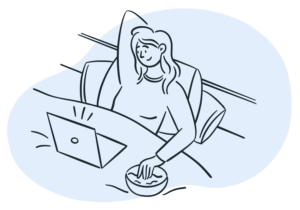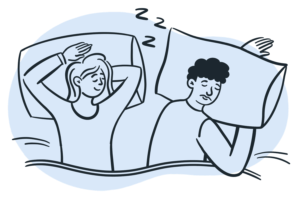Sleep and Nutrition: How Food Affects Your Sleep
Disclosure: By clicking on the product links in this article, Mattress Nerd may receive a commission fee at no cost to you, the reader. Read full disclosure statement.
Have you ever spent a night tossing and turning after a particularly spicy meal? Or could barely keep your eyes open after skipping your usual hearty breakfast?There’s a reason for that.
Sleep and nutrition are intimately linked—what we eat and drink can affect how well we sleep, and our sleep patterns can impact what foods we crave and how our bodies process the nutrients we consume. Getting a good night’s sleep can sometimes be as simple as tweaking your diet to include more (or less) of certain foods and nutrients.
Let’s take a look at how sleep and nutrition affect each other and how you can optimize both to feel your best.
How is Nutrition Related to Sleep?
Sleep and nutrition are interconnected in many ways. They work together to promote health and keep our bodies working how they should.
A poor diet can impact the hormonal pathways that regulate sleep
Two main hormones regulate our sleep patterns: melatonin and serotonin. Melatonin is responsible for making us feel sleepy, while serotonin is a chemical that helps regulate mood and energy levels.
What we eat can affect the production of these hormones and, as a result, our sleep patterns. For example, foods that contain tryptophan—an amino acid that’s converted into serotonin—may help promote sleepiness. That’s why you may have heard that eating turkey (a food high in tryptophan) makes you tired. Although science is still figuring out on how much effect it actually has.
On the other hand, foods high in sugar can interfere with the production of serotonin and increase arousal and alertness, which disrupts sleep.
A lack of sleep can cause overeating
Getting enough sleep is crucial for maintaining a healthy-for-you weight as it helps regulate your leptin and ghrelin hormones, influencing your hunger levels and overall appetite.
Research shows that a lack of sleep increases ghrelin production while decreasing leptin production. The result is increased hunger and appetite, which could lead to eating more than is necessary and eventually gaining weight.
Interestingly enough, the amount of rest we get even impacts how we think about food. Studies show that people who sleep less than seven hours a night show enhanced brain activity that views food as a positive reward rather than just something to fuel the body. This makes sense when you think about it—if we’re tired, we’re more likely to crave high-calorie foods that give us a quick burst of energy.
A poor diet influences the quality of sleep
What you eat can have significant effects on the quality of your sleep. Eating a nutritious diet helps improve the overall quality of your sleep, while a poor diet can lead to many restless nights.
Studies have found that people who consume less fiber and more saturated fat and sugar report less deep, restorative REM sleep. REM is the deepest stage of sleep and is important for consolidating memories, reducing stress, and promoting healthy brain function.
Conversely, people who eat more fiber are predicted to fall asleep faster and have longer and more efficient sleep patterns. Foods high in fiber help slow down the digestion process, which can lead to a steadier release of glucose into the bloodstream and promote feelings of fullness—two things that are essential for a good night’s sleep.
When we eat influences our circadian rhythms
Circadian rhythms influence our sleeping patterns. Your circadian rhythm is essentially a daily cycle that affects your mental, behavioral, and physical state. This 24-hour clock keeps all of our bodily functions (like metabolizing food) on schedule and is influenced by many things, especially our diets.
Studies have found that altering your eating schedule—especially when done abruptly—simultaneously messes with your internal clock. It’s called misaligned eating, and it can not only disrupt your sleep but increase your likelihood of excess weight. Some examples of misaligned eating include:
- Bedtime snacking
- Intermittent fasting
- Overeating
- Skipping meals
When you time your meals correctly and eat regular, well-balanced meals throughout the day, you help keep your circadian rhythms in check. This promotes optimal sleep and overall health.
Best Foods to Eat for Sleep
If you want to eat your way to a better night’s sleep, focus on incorporating these nutrient-rich foods and drinks into your diet:
- Chamomile tea
- Almonds
- Milk
- Tart cherry juice
- Walnuts
- Fatty fish like salmon, mackerel, tuna, and trout
- Turkey
- Passionflower tea
- Cottage cheese
- Plain yogurt
- Bananas
- White rice
- Oatmeal
- Kiwi
- Cashews
- Pistachios
- Spinach
- Black beans
- Avocados
- Sage
- Basil
- Raw honey
- Hummus
- Berries
Adding these foods to your diet might help improve the quality of your sleep and promote feelings of calm and relaxation when it’s time to hit the hay.
Foods to Avoid Before Bed
Just as certain foods can help you sleep better, some foods and drinks should be avoided before bedtime. Steer clear of the following within a few hours of bedtime to promote more restful sleep:
- Chocolate
- Aged cheese
- Preserved meats like bacon, pepperoni, or ham
- Curry
- Hot sauce
- Mustard
- Ice cream
- Alcohol
- Celery
- Watermelon
- Cucumbers
- Caffeine
- Tomatoes
- Soy sauce
- Eggplant
- Raw onion
- Citrus juice
- Broccoli
- Cauliflower
- Dried Fruit
- Brussels sprouts
In general, avoid consuming fatty and greasy foods as well as anything with alcohol or caffeine at least a few hours before bed, as these can cause indigestion and make it difficult to sleep. High-fiber foods are an important addition to a good night’s sleep, but not as your night-time snack as they can cause gas and bloat, which can disrupt your rest.
Takeaway
Sleep and nutrition are two important pieces of the puzzle when it comes to maintaining your health. Getting enough sleep helps to regulate your hunger hormones and can reduce cravings for unhealthy foods. Likewise, eating a nutritious diet helps improve the quality of your sleep and can promote feelings of calm and relaxation.
To get the most out of your slumber, aim for seven to eight hours of sleep per night and focus on incorporating nutrient-rich foods into your diet. Avoid eating fatty, greasy, or high-fiber foods before bed, as these can cause indigestion and make it difficult to sleep.
If you have trouble sleeping, speak with your doctor as there may be an underlying condition causing your insomnia. In the meantime, following these tips can help you get a good night’s rest and reach your health goals.
Sources
Binks H, et al. (2020). Effects of diet on sleep: A narrative review. https://www.ncbi.nlm.nih.gov/pmc/articles/PMC7230229/
Cleveland Clinic. (2020). Sleep basics. https://my.clevelandclinic.org/health/articles/12148-sleep-basics
Eckel-Mahan K, et al. (2013). Metabolism and the circadian clock converge. https://www.ncbi.nlm.nih.gov/pmc/articles/PMC3781773/
Greer S, et al. (2013). The impact of sleep deprivation on food desire in the human brain. https://pubmed.ncbi.nlm.nih.gov/23922121/
Harvard School Of Public Health. Fiber. https://www.hsph.harvard.edu/nutritionsource
Kim T, et al. (2015). The impact of sleep and circadian disturbance on hormones and metabolism. https://www.ncbi.nlm.nih.gov/pmc/articles/PMC4377487/
National Institute of General Medical Sciences. (2022). Circadian rhythms. https://www.nigms.nih.gov/education/fact-sheets/Pages/circadian-rhythms.aspx
Spiegel K, et al. (2004). Brief communication: Sleep curtailment in healthy young men is associated with decreased leptin levels, elevated ghrelin levels, and increased hunger and appetite. https://pubmed.ncbi.nlm.nih.gov/15583226/
St-Onge M, et al. (2012). Sleep restriction leads to increased activation of brain regions sensitive to food stimuli. https://pubmed.ncbi.nlm.nih.gov/22357722/
St-Onge M, et al. (2016). Fiber and saturated fat are associated with sleep arousals and slow wave sleep. https://pubmed.ncbi.nlm.nih.gov/26156950/
Wehrens S, et al. (2017). Meal timing regulates the human circadian system. https://www.ncbi.nlm.nih.gov/pmc/articles/PMC5483233/


